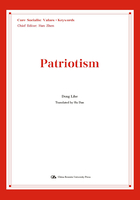
Further Readings
Rememberingancestors and finding an ever-resting place in hometown is a long tradition of the Chinese people.Having resided abroad for long years, many overseas Chinese still feel unsettled.Deep in their mind, they are connected with their homeland.Missing their homeland and worshiping their ancestors is a strong sentiment of overseas Chinese.Recent years have seen more and more overseas Chinese coming home to look for roots and to worship their ancestors and hometown rivers.Some of them wish that they spend their last years and then rest forever in their hometown.Even if they pass away on foreign soil, they would like to rest in Chinese cemeteries.Hence, Chinese-style cemeteries have appeared in many parts of the world.
I live on the bank of a big wide river.On both sides are fields of fragrant rice.On the river are those familiar sails, shouts of boatmen...This is my beautiful motherland, where I was born and grew up.
——Lines from the song My Motherland
Flag of Five-Red-Star flies high, Songs of triumph loud.We are singing for our dearmotherland.She is becoming more and more prosperou.s..All those highmountains, greatplains, wideand swift flowing Yellow andYangtze rivers, sovast and so beautifu.l This is ourdear homeland.
——Lines from the song Singing for Motherland
Patriotism is derived from one's affection for homeland. A person who loves his hometown will naturally love his motherland country. Since ancient times, loving one's homeland has always been an important part of patriotism for the Chinese people. According to Shih Chi(Record of History), when Confucius, while residing in a foreign state, learned that Tian Chang rebelled in his home state of Lu, he called upon his disciples, saying, “The State of Lu is where our parents live and tombs of our ancestors lie. Now it is in danger. Why don't you go and help? ”. Then, Confucius sent his disciple Zi Gong to help Lu. To some extent, since the Opium War, all the struggles against foreign aggressors were derived from love for homeland, whether it was the fight of the Sanyuanli people against the British, the peasant uprising of the Taiping Kingdom, the Boxer Movement, or the War of Resistance against Japan. For example, during the War of Resistance against Japan, a famous song The Chorus of the Yellow River said, “Defend our home village. Defend the Yellow River. Defend the whole of China. ”This escalating level of calling was very effective in mobilizing the Chinese to unite and fight against Japanese invaders.
Homeland is not just a piece of land where you were born and lived a life, or an area you have your compatriots, it is also a land of your culture where you feel free to walk about. Therefore, having confidence and recognition in one's own cultural tradition is an important feature of patriotism. Culture is the foundation, the soul and the spiritual land of a nation. From the first day a person is born, he is embraced in the arms of his mother of homeland and begins to feed on the milk of culture of his motherland. Patriotism is rooted in the soil of culture. And fine culture is the inexhaustible source of national esteem, confidence and proud.
Quotations
We love poetry of the Tang and Song dynasties because we have a Chinese heart. We love Chinese cuisine because we have a Chinese stomach. The feeling we have for our country is of heart and stomach.
——Famous writer Wang Meng